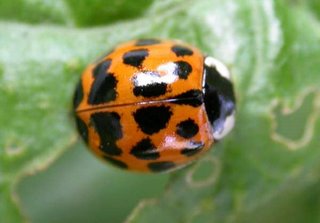
Alien introductions can be disastrous: the rabbits in Australia, that turned whole areas into desert; the rats, cats, goats and pigs that wiped out endemic species (try to find a kiwi or a kakapo or a takahe in New Zealand now); the invasive weeds that choke estuaries, and - nearer to home - the grey squirrel, that has done for our native red squirrel what the conquistadores did for the Incas.
And now there's another: the Harlequin Ladybird. I went recently to a talk given by Dr Mike Majerus, a leading coleopterist and a specialist in ladybirds. I had no idea what a threat this recent invader is likely to be to most of our native ladybird species. It breeds shamelessly, it is omnivorous, it is big, and it is ruthless. It is the Dalek of the insect world (pace those people who have welcomed the return of Dr Who to BBC - goodness, they must be desperate!). Exported mysteriously from its Asian homeland, where it apparently behaves itself, it has reached plague proportions in north America, and is now busy working its way up Europe and into Britain. It has already arrived in fact.
Dr Majerus urged us all to go out and check the ladybirds in our gardens, recording the good guys as well as this invader. There's even a laminated sheet giving tips on identifying the Harlequin as well as our common species (if you want details, visit www.harlequin-survey@ceh.org and www.ladybird-survey.org ). On the evening of his talk, he handed out Petri dishes containing various examples of the wicked beetle, and here lies my problem: it can be - at least for me - very difficult to differentiate from our familiar coccinella species. Moreover, I think it should be called the chameleon not the Harlequin, because it has so many variations from mainly black with a couple of red bands, to mainly red with a few black blotches. Fortunately, there is one way to be sure. Put one on your finger, and if it gives you a vicious bite, it's a Harlequin. Apparently, it also stinks.
Another gloom and doom story? Well, yes and no. Fortunately, there is a parasitic wasp that might do for it. Already scientists are talking about using the wasp as a biological control. Let us it works, because if it doesn't, the Harlequin will eventually wipe out most of our other ladybird species, along with aphids, lacewings and other aphid-feeders. And if this happens, species higher in the food chain, such as birds, are going to suffer a serious famine.
No comments:
Post a Comment